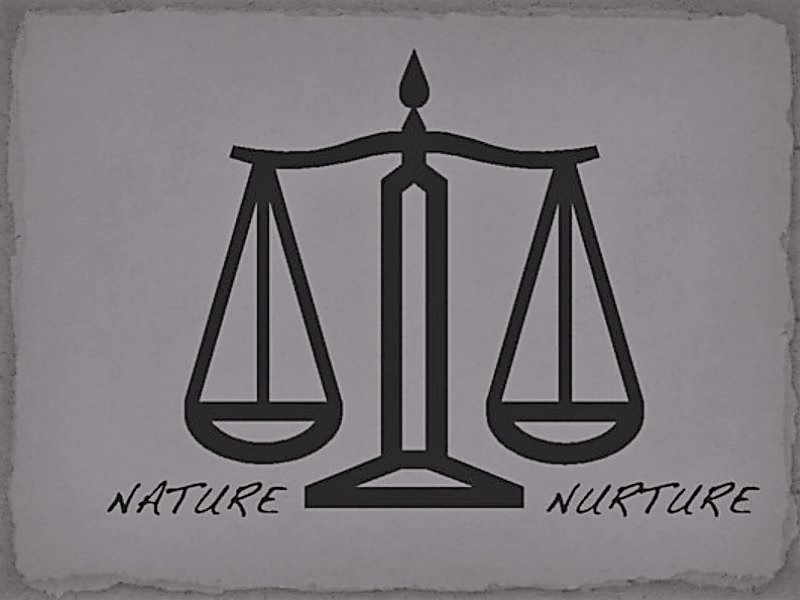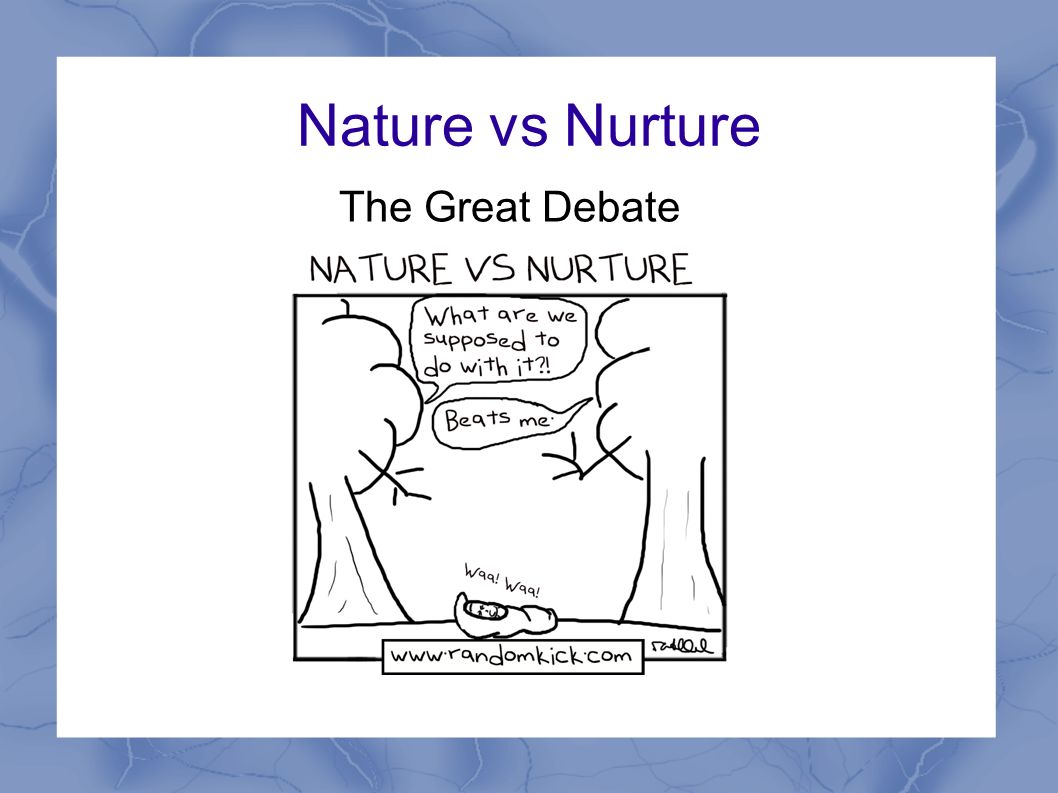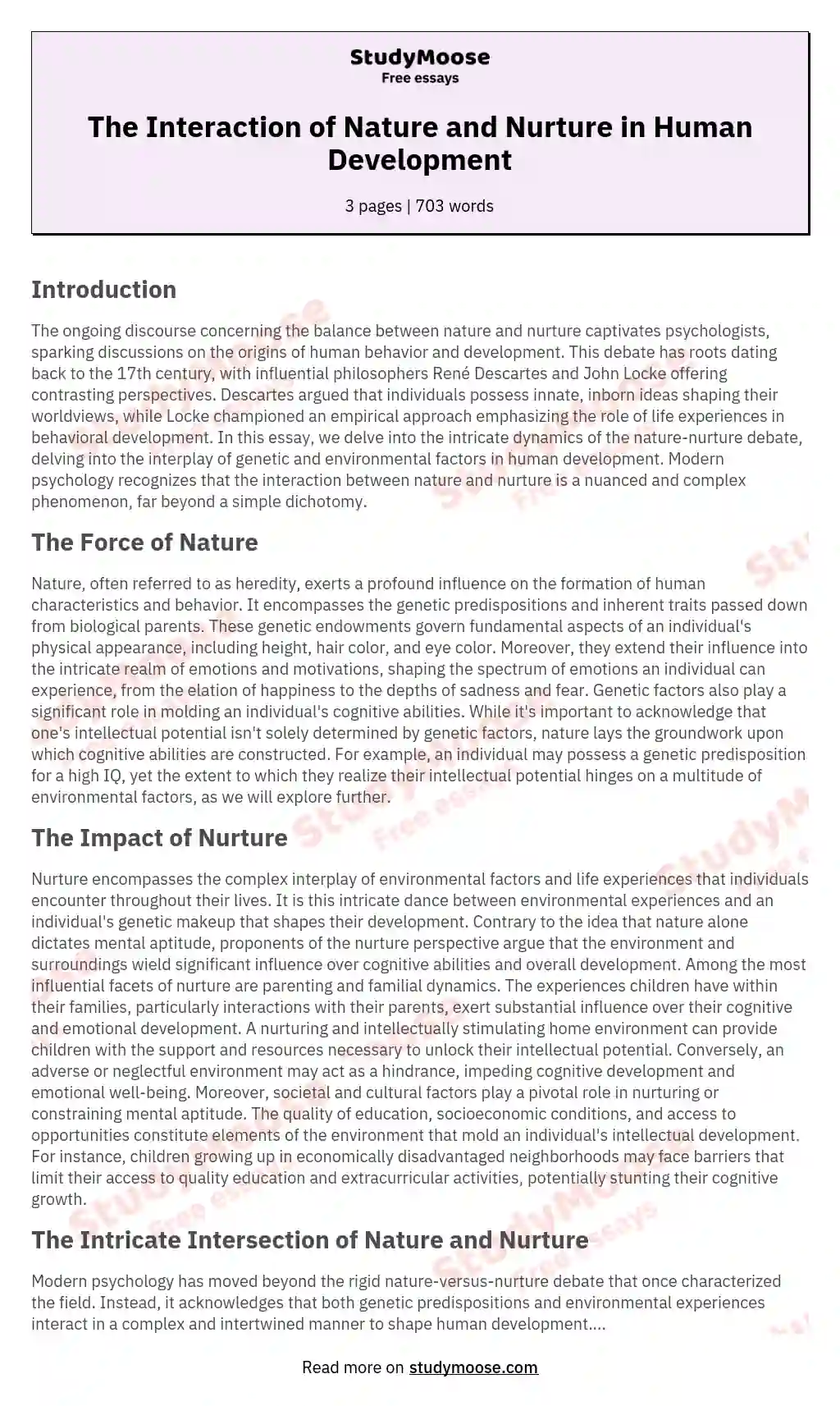The nature versus nurture debate is a long-standing discussion in psychology and sociology that centers on the relative influence of genetics and the environment in shaping an individual's characteristics, behaviors, and abilities.
On one side of the debate, those who argue for the influence of nature believe that an individual's traits and characteristics are largely determined by their genetics, or the inherited traits that are passed down from their parents. This perspective suggests that an individual's traits and behaviors are largely predetermined by their genes, and that the environment has little impact on who they are as a person.
On the other side, those who argue for the influence of nurture believe that an individual's traits and characteristics are largely shaped by their environment, including their experiences, upbringing, and cultural influences. This perspective suggests that an individual's traits and behaviors are largely the result of the experiences and opportunities they have encountered throughout their life, and that genetics plays a lesser role in determining who they are as a person.
One of the key arguments in the nature versus nurture debate is the extent to which genetics and the environment each contribute to the development of an individual's characteristics and behaviors. While it is generally agreed upon that both nature and nurture play a role in shaping an individual's traits and behaviors, the exact balance between the two is a subject of ongoing debate.
One approach to understanding the nature versus nurture debate is to consider the different ways in which genetics and the environment interact to influence an individual's traits and behaviors. For example, genetics may influence an individual's predisposition to certain behaviors or traits, while the environment may provide the opportunities or experiences that trigger the expression of these traits. Similarly, the environment may shape an individual's behaviors and characteristics in ways that are influenced by their genetics, such as through the influence of cultural norms and values on an individual's personality.
Overall, the nature versus nurture debate is an ongoing discussion that highlights the complex interplay between genetics and the environment in shaping an individual's characteristics and behaviors. While it is clear that both nature and nurture play a role in an individual's development, the exact balance between the two is a subject of ongoing research and debate.
What is Epigenetics? The Answer to the Nature vs. Nurture Debate

However, genetics is not solely responsible for this. Even if you had a family member with depression, this does not mean you can develop depression, too. This is true for eating habits as well, especially since parents do much of the cooking for the children until they reach adulthood. Twin studies use people with similar genetic material to see how their environment influenced them. Epigenetics explains how early experiences can have lifelong impacts. While parents and policymakers might hope that playing Mozart recordings to newborns will produce epigenetic changes that enhance cognitive development, there is absolutely no scientific evidence that such exposure will shape the epigenome or enhance brain function. What do you think? During development, the DNA that makes up our genes accumulates chemical marks that determine how much or little of the genes is expressed.
What is the nature vs. nurture debate? & Why does it matter?

That can be carried into many relationships such as teaching, coaching, and even friendships. Developmental Psychology studies development from conception until death. What is the nature versus nurture debate about? Both of those statements are politically incorrect and can be debated to be untrue. For example, how tall they could eventually become or the kind of temperament they could have. Recent research demonstrates that there may be ways to reverse certain negative changes and restore healthy functioning, but that takes a lot more effort, may not be successful at changing all aspects of the signatures, and is costly. Is there even the slightest possibility, despite the fact that we might not ant to admit it? However, childhood experiences or traumatic events can flip a switch for mental disorders.

It makes sense too, in my opinion. During development, the DNA that makes up our genes accumulates chemical marks that determine how much or little of the genes is expressed. The causes of mental disorders are complicated, and the explanation behind the risk factors is complex. Mental Disorders Nature plays a big role in the development of mental health conditions like schizophrenia, bipolar disorder, or major depression. Physical, emotional, or sexual abuse during childhood may lead to an increased chance of developing a mental illness. No one can give you a professional insight better than a licensed mental health practitioner.

Each KCC therapist, counselor, and psychiatrist is highly trained, professional, certified, and experienced in providing optimal mental health care for Kentucky and Ohio residents. The chemicals inside the brain are a part of nature, as they occur naturally inside the body. Sexual Orientation Another most debated topic in the nature or nurture issue is homosexuality. In fact, scientists have discovered that early experiences can determine how genes are turned on and off and even whether some are expressed at all. This is a given fact.








